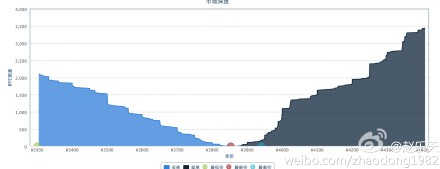OKCoin, once the second largest mainland China-based bitcoin exchange (after BTC China) according to volume, has been accused of faking its trading volume data.
The website stopped taking new deposits in the aftermath of the Chinese central bank implementing a ban disallowing banks and third-party payment services from working with bitcoin exchanges, leaving traders temporarily unable to charge their fiat currency accounts or cash out on some exchanges.
In the days following rumours of the ban, while traders panic-sold their bitcoin holdings and would-be buyers were barred from making deposits into their accounts, many were surprised to find that the trading volume on OKCoin remained unrealistically high.
The exchange rates, despite plunging, maintained levels on a par with other exchanges such as Huobi.com, which circumvented the ban by allowing traders to charge their accounts by transferring money to its CEO’s personal bank account.
The concern was first raised by someone under the pseudonym Shi Diaomao, a self-proclaimed bitcoin arbitrageur who makes profit by buying and selling BTC on different platforms to exploit the exchange rate gap.
[post-quote]
In his article posted on 20th December on Xueqiu, one of China’s most popular investors' social media platforms, Shi claims that in a two-hour period on 19th December, OKCoin’s data indicates that over 30,000 BTC changed hands.
However, by comparing the number with the tally of selling and buying orders that were displayed separately, Shi concluded that the real transaction volume could be as low as one tenth of what the company purported to exchange.
Shi said after noticing the discrepancy, he immediately contacted the website’s customer service rep, who failed to provide a plausible explanation and later became unresponsive on Xueqiu.
During the process of communication, Shi saw that the displayed volume suddenly plunged, which reinforced his suspicion that the website had previously faked its trading volume and was correcting it now that it was in danger of being caught red-handed.
In an online audio interview, Shi said that he would not call OKCoin out and accuse it of manipulating the exchange rate, but he cautioned traders against the exchange, claiming that it “plays both the player as well as the referee”.
In response, Star Xu (Xu Mingxing), CEO of OKCoin who is also believed to be one of the largest bitcoin holders in China, issued a very brief explanation, in which he attributed the discrepancy to the company allowing large traders to trade through its API rather than the webpage interface – an explanation, if true, that may be somewhat hypocritical given that only a couple days ago Xu wrote a statement criticizing the use of “high-frequency trading software”.
Many perceive Xu’s explanation as a cover-up, among them, some Chinese bitcoin celebrities such as Li Xiaolai and Zhao Letian who posted on Sina Weibo agreeing that OKCoin’s data was problematic.
Zhao Letian’s posting states:

62d41719gw1ebq22myr3uj21kw0njjub-1

62d41719gw1ebq22gtl0mj21kw0lxdje
Users also question OKCoin’s claim that it is the world’s largest litecoin exchange.
One posting published on 19th December on Sina Weibo says:
Xu Mingxing was previously scheduled to host a Q&A session on Xueqiu on 20th December, but it has since been cancelled.
As of 2:52 PM CST, 21st December, the daily trading volume displayed on OKCoin is 4,215.52 BTC, which has shrunk dramatically from its previous level of tens of thousands per day.
Chinese stock market image via Shutterstock
DISCLOSURE
Please note that our privacy policy, terms of use, cookies, and do not sell my personal information has been updated.
The leader in news and information on cryptocurrency, digital assets and the future of money, CoinDesk is a media outlet that strives for the highest journalistic standards and abides by a strict set of editorial policies. CoinDesk is an independent operating subsidiary of Digital Currency Group, which invests in cryptocurrencies and blockchain startups. As part of their compensation, certain CoinDesk employees, including editorial employees, may receive exposure to DCG equity in the form of stock appreciation rights, which vest over a multi-year period. CoinDesk journalists are not allowed to purchase stock outright in DCG.
:format(jpg)/cloudfront-us-east-1.images.arcpublishing.com/coindesk/U3CLO4XQIRDBXHBXSKDDMZ2RZQ.jpg)

:format(jpg)/cloudfront-us-east-1.images.arcpublishing.com/coindesk/VJSDU5RDUNERJMWFONKDM4NKYE.jpg)
:format(jpg)/cloudfront-us-east-1.images.arcpublishing.com/coindesk/PFEHNV7HU5CCPFROJKQIPWNYJU.jpg)
:format(jpg)/cloudfront-us-east-1.images.arcpublishing.com/coindesk/YLVK7NL7PJAVRJVREC7DTR6XME.jpg)
:format(jpg)/cloudfront-us-east-1.images.arcpublishing.com/coindesk/EXPOIBREMFHSHA7CVOGJ5TDWUY.jpg)